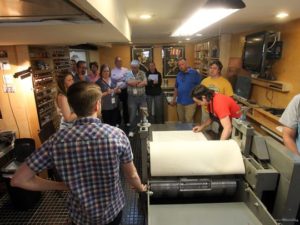By Matthew Patane, The Des Moines Register

(Photo: Matthew Patane/The Des Moines Register)
Two decades ago, when Iowa was still reeling from the farm crisis and its economy was “lower than whale poop in the bottom of the ocean,” multimillionaire John Pappajohn had a vision to make the state a prime spot to start new businesses.
Starting in 1996, Pappajohn provided funding to create five centers at universities across Iowa to help “plant the seed” of entrepreneurship.
Now, as the John Pappajohn Entrepreneurial Centers celebrate their 20th anniversary, Pappajohn still wants Iowa to be the most entrepreneurial state in the union.
“We’re not a Silicon Valley, but we’ve just expanded and done so well and people have a can-do philosophy now,” Pappajohn said.
The directors of the five entrepreneurial centers say they are seeing dividends on Pappajohn’s early and continued investment. Necessary supports for startups that didn’t exist 10 or 20 years ago, they say, have emerged and are being built by them or others in Iowa.
By their own reporting to Pappajohn, the centers and their affiliated programs have helped start more than 6,100 businesses and had more than 237,000 participants since their inception.
While they report progress, however, Iowa and its startups still struggle with obstacles and data that show there is work to be done. A recently-released report from The Kauffman Foundation ranked Iowa 43rd out of the 50 states on its measurement of startup activity.
Demystifying entrepreneurship

John and Mary Pappajohn take part in groundbreaking ceremonies for The John and Mary Pappajohn Higher Education Center in Des Moines in 2003. (Photo: Register file photo)
Among the new companies that have been started are Swinetech, out of New Sharon, which has endeavored to reduce the number of piglets that die from being crushed by their mothers.
Swinetech’s co-founder, Matt Rooda, said he applied to the University of Iowa’s Venture School program after it sent out an email looking for applicants.The program helps entrepreneurs develop business plans for their potential companies.
Rooda applied, was accepted and tapped a friend to help him start a company.
“For us, it was perfect, because it was everything we needed to do at that point in time,” Rooda said. “I remember them asking ‘Well, who are your partners going to be?’ and I was just clueless.”
He and his team went on to participate in Cedar Rapids’ Iowa Startup Accelerator in 2015. The opportunity arose, he said, because Venture School had them pitch at a weekly startup event that the accelerator’s head was attending.
More recently, Swinetech has pitched at competitions around the country, raising about $155,000 in the process.
The entrepreneurial centers do not regularly report or follow businesses that have shut down or failed, some directors told the Register.
The centers traditionally have focused on a mix of classroom education, community outreach and connecting founders with needed resources. North Iowa Area Community College also operates a venture capital fund to invest in startups.
Now, the centers have plans to offer new degree offerings, more outreach and expanded programming, such as bringing entrepreneurship training to earlier grade levels, their directors say.
“Starting in fifth grade, you can help demystify what that big ‘entrepreneurship’ word means, what it really takes to be your own boss,” said Tim Putnam, the director of NIACC’s center.
Iowa State has recently started a number of new programs, such as student startup development program CyStarters.
The university is also implementing a new major in entrepreneurship targeted at students who want to run their own companies.
“Instead of pursuing a management major and trying to be a CEO of a large company, maybe they’ll run a family business or start their own,” said Judi Eyles, assistant director of Iowa State’s Pappajohn Center.
Drake’s leaders said they want to emphasize boot camps for female and immigrant entrepreneurs.
Progress seen, but work remains
Many of the JPECs leaders said that when they came to Iowa or started at their centers, there was little talk of entrepreneurship in the state.
“When we first started talking about entrepreneurship, working with economic developers, they thought what we were doing was cute and nice and kind of ‘go about your business and leave us to recruit the businesses to come to north Iowa,’” Putnam said. “Today, we see communities talking, living and breathing how they can help develop and grow their own entrepreneurs.”
When he moved to Des Moines in 1994, Tom Swartwood said, “there was virtually no startup activity talked about. There was no commotion.”
“Even if they were failures, we needed more people trying to do more things, and we needed to celebrate them and talk about them and get more of that visceral energy going,” said Swartwood, the assistant director of Drake’s Pappajohn Center.
David Hensley, the director of UI’s center, said he, like many of his peers, moved away from Iowa after graduating from college. He came back in 1997 but said “the vibrancy and interest in entrepreneurship was not very high in the state.”
“Over the last 20 years, I think the energy, the resources, the belief that you can be a successful entrepreneur in Iowa … (is) now a belief of young people,” he said.
Efforts across Iowa, from new startup accelerators to co-working spaces, have begun in recent years. New investors and funds have emerged, and the state offers incentives to startups and investors through its economic development agency.

A group of teachers from across the state visit Tomas Lasansky’s studio on Wednesday, June 22, 2016. The event was part of the STEM Innovator program held by the University of Iowa John Pappajohn Entrepreneurial Center and College of Education to help merge science and math practices with art. (Photo: David Scrivner/Iowa City Press)
According to Kauffman, Iowa’s rate of new entrepreneurs in 2016 was 0.18 percent, the same as 2015. That means Iowa had 180 new entrepreneurs for every 100,000 adults in any given month.
In 1998, the rate of new entrepreneurs was 400 for every 100,000, the Kansas City-based foundation reported.
But, Iowa’s “opportunity share” in 2016 was just under 90 percent, meaning a vast majority of Iowa’s entrepreneurs were starting businesses because they saw market opportunities, instead of out of the necessity of needing a job.
The state also has a low “churn rate” of new businesses. Higher churn rates — averaging the rate of business starts and business deaths over a given year — are attributed to a more entrepreneurial economy.
Between 2011 and 2012, Iowa’s churn rate was about 85 establishments out of every 1,000, calculated using the most recently available census data. That was the lowest churn rate among all 50 states and the District of Columbia.
Iowa’s churn rate was about 102 establishments out of every 1,000 between 1996 and 1997, the second-to-lowest rate.
“We’re on the complete opposite end of the entrepreneurial dynamic. You need risk taking, which Iowa seems to be lower in,” Iowa State economist Dave Swenson said.
Some JPEC directors said rankings like Kauffman’s and other data may not pick up what they and others are seeing on the ground.
Randy Pilkington, the director of UNI’s JPEC, said the Cedar Valley’s entrepreneurial ecosystem “has changed dramatically” in the past five years. He credited the change to the leaders of older startups, including some his JPEC helped incubate, coming back around to support emerging companies.
“You might not see a big deal with the numbers in Kauffman right away, but we feel it and sense it every day in what we do now in that the environment has changed dramatically, especially in the last two years,” Pilkington said.
Pappajohn pointed to other lists like one recently from CNBC that named Iowa the ninth best state to start a business.

Recent Comments